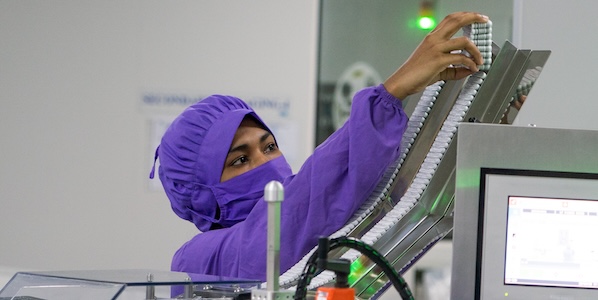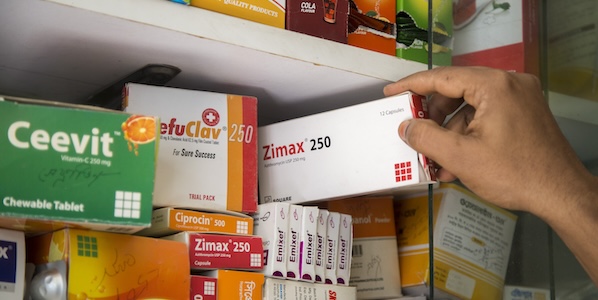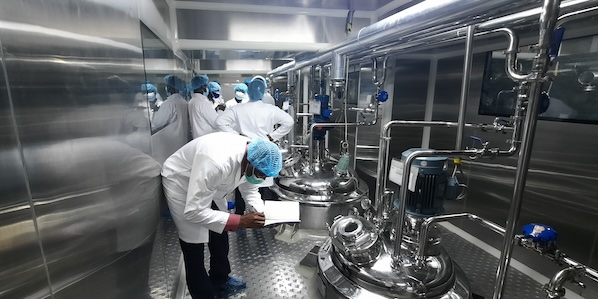In Mali, maternal mortality rates are among the highest in the world and malaria is a leading cause of death, disproportionately affecting young children and pregnant women. Access to quality-assured medical products is critical to reversing these trends and saving lives. Mali has taken important steps in recent years to ensure the quality of medical products circulating in the country, including recalling products found to be substandard or falsified (SF), enforcing recalls, and closely monitoring progress to fortify the regulatory systems that oversee the importation of medical products.

Adopting risk-based approaches
As a part of that effort, the National Health Laboratory (Laboratoire National de Santé, LNS) and the Mali Directorate of Pharmacies and Medicines (Direction de la Pharmacie et du Médicament, DPM) adopted a risk-based approach to post-marketing surveillance (RB-PMS) of medicines quality. Traditional post-marketing surveillance can be expensive, complex, and time-consuming. By contrast, the RB-PMS approach relies on a streamlined strategy for sampling and testing that could yield results for the sampled products at a lower cost. In essence, RB-PMS channels precious resources toward medicines and locations that present the highest risks to patients.
Sampling medicines for malaria, reproductive, and maternal and child health
Earlier this year, DPM’s multisectoral technical working group reported results from the recent round of RB-PMS. The technical working group operates with the support of the PQM+ program, funded by the U.S. Agency for International Development (USAID). RB-PMS work in Mali began in 2020, with a first round of results reported in 2021.
While these RB-PMS results are not nationally representative, they alert the government to challenges in targeted locations – in this case, high-risk parts of the country – for further action to protect the public and to inform policy going forward. This latest exercise sampled antimalarial and reproductive, maternal, newborn, and child health (RMNCH) medicines from points of sale (e.g., hospitals and pharmacies) that were identified using stratified and randomized sampling in nine regions: Gao, Kayes, Kidal, Koulikoro, Menaka, Mopti, Sikasso, Segou, and Taoudenit.
Survey results
Six percent of surveyed medicines were found to be substandard or falsified, meaning their ingredients did not comply with quality standards. Samples were collected from targeted facilities and subjected to up to three levels of scientific testing: physical/visual inspection; Minilab™ screening; and compendial or confirmatory testing at the National Health Laboratory’s medicines quality control laboratory. The Minilab™ is a portable testing kit used to easily identify poor-quality and counterfeit medicines.
Most of the SF medicines identified were RMNCH products – oxytocin, diazepam, and magnesium sulfate. The remainder were the antimalarials artemether + lumefantrine, quinine, and artemether injection. Most RMNCH drugs sampled in the survey were not registered with the Ministry of Health, including none of the samples of diazepam and nearly 70 percent of the oxytocin and magnesium sulfate samples. More than half of the surveyed antimalarials (56.8 percent) were also unregistered.
The highest percentage of SF samples came from the Koulikoro region, with nearly 53 percent of samples not meeting the standards. Of the unregistered products found, 68 percent have labels that indicate the products come from India and China, underscoring the need for a functional medicines registration system and implementation of import control checks.

Strengthening the legal framework
Under the leadership of Mali’s LNS, the working group is pushing for a legal framework that will make medicines quality assurance and regulation part of the core Ministry of Health functions with legitimate government enforcement mechanisms. A stronger legal framework for regulation of medical products would improve their regulation, thus helping to ensure quality medical products are available to prevent and treat diseases such as malaria as well as to improve maternal, newborn, and child health.
As a result of this round of RB-PMS, Mali took several enforcement and follow-up actions, ordering the withdrawal of SF batches of diazepam 10mg/2ml injectable and Combiart 20/120mg (artemether + lumefantrine) and quarantining magnesium sulfate. In addition, the government circulated the RB-PMS report to health facilities, pharmacies, and the public to create awareness of the presence of the falsified diazepam injectable batch (including a photo of the SF sample) and educated pharmacists and managers of health facilities, pharmacies, and wholesalers about the frequency of SF products in the country.
MedRS tool
The MedRS tool helps medicines regulatory authorities develop risk-based sampling strategies to support national PMS programs while maximizing available resources. MedRS integrates and automates the science and practice of risk-based PMS into a single platform. The tool enables countries to consistently implement risk-based approaches to answer important sampling questions, including: (1) which geographic locations and outlets should be sampled; (2) how many geographical locations and outlets should be sampled; and (3) how many samples should be collected to ensure statistical significance. The products selected for this RB-PMS exercise were scored by the PMS technical working group of experts as having the highest risk of being SF based on their production complexity, stability, good manufacturing practices compliance, and distribution chain complexity.








